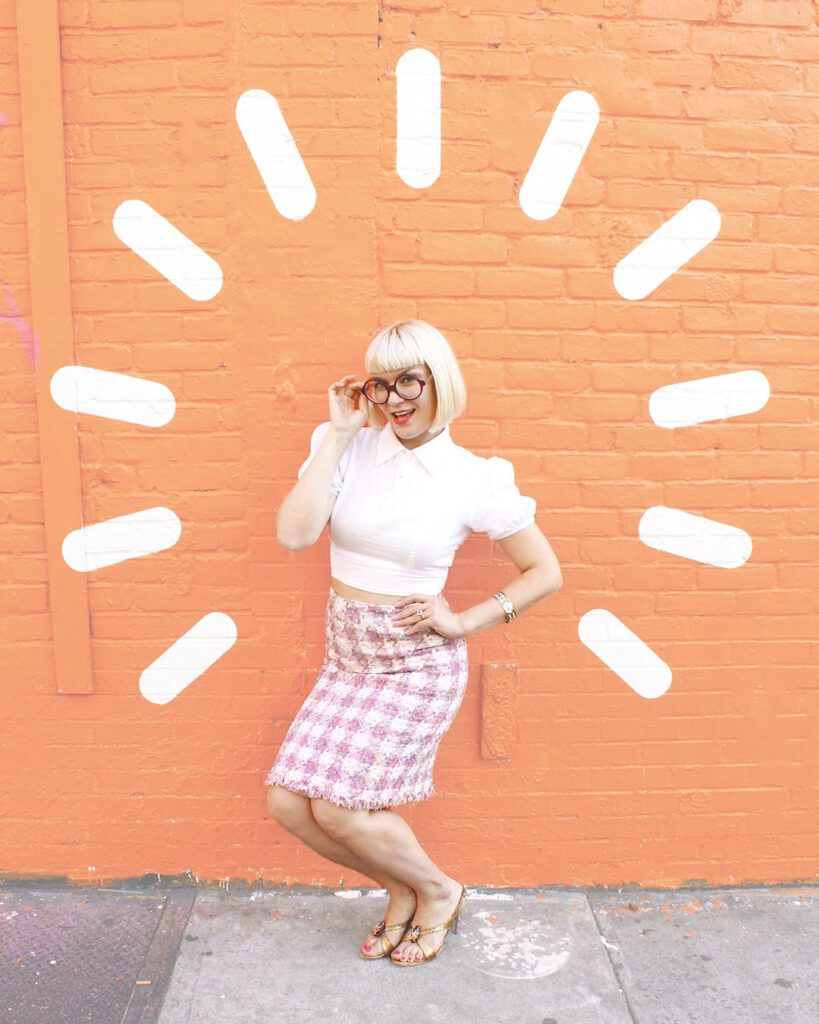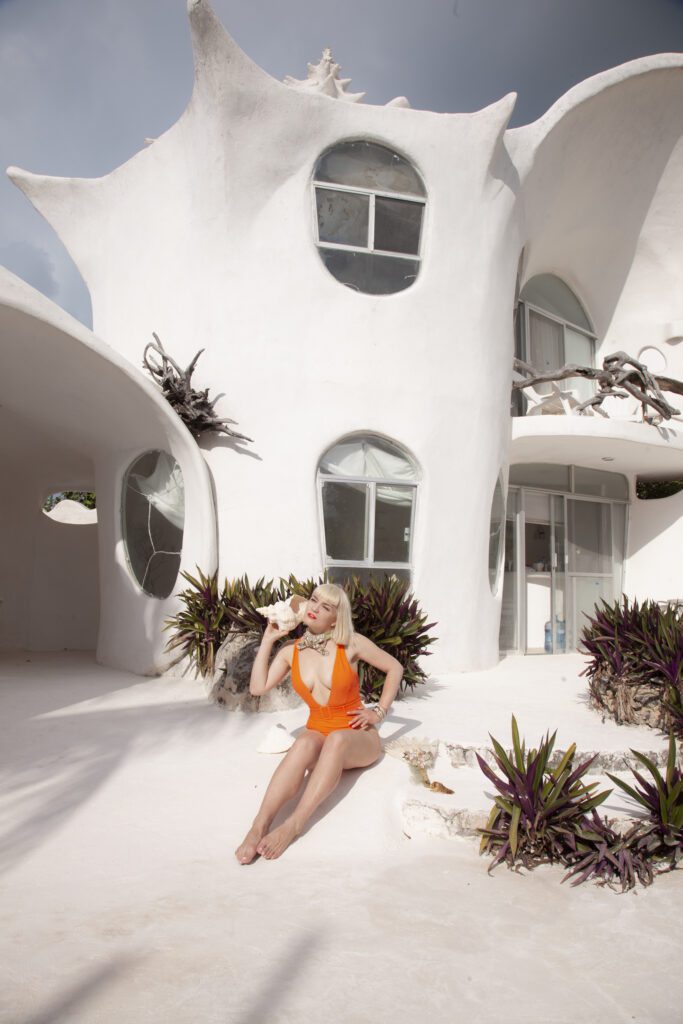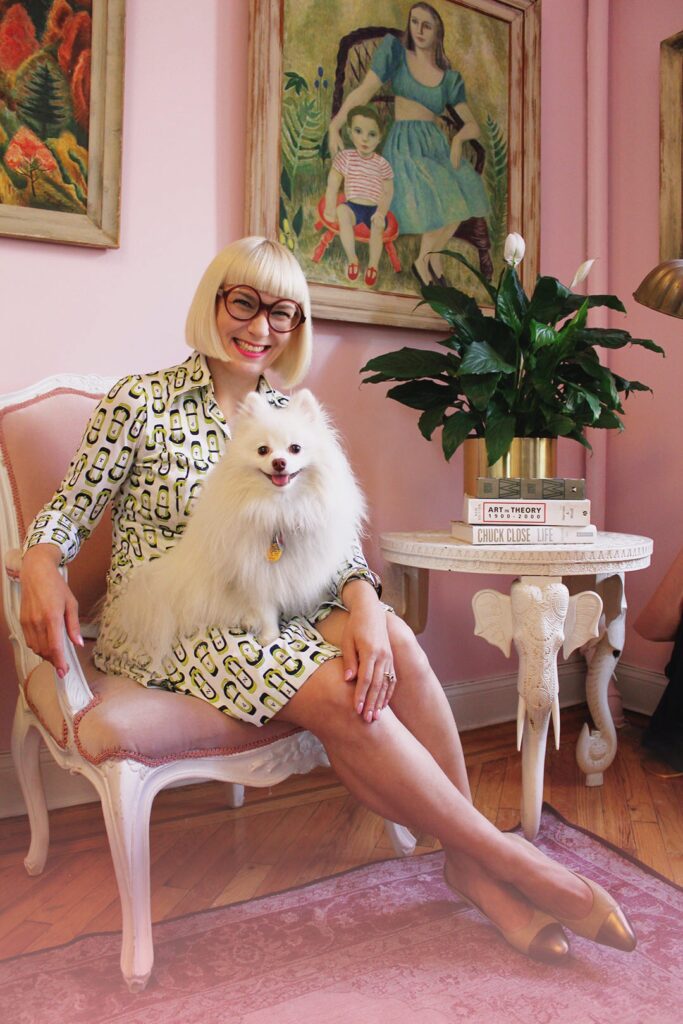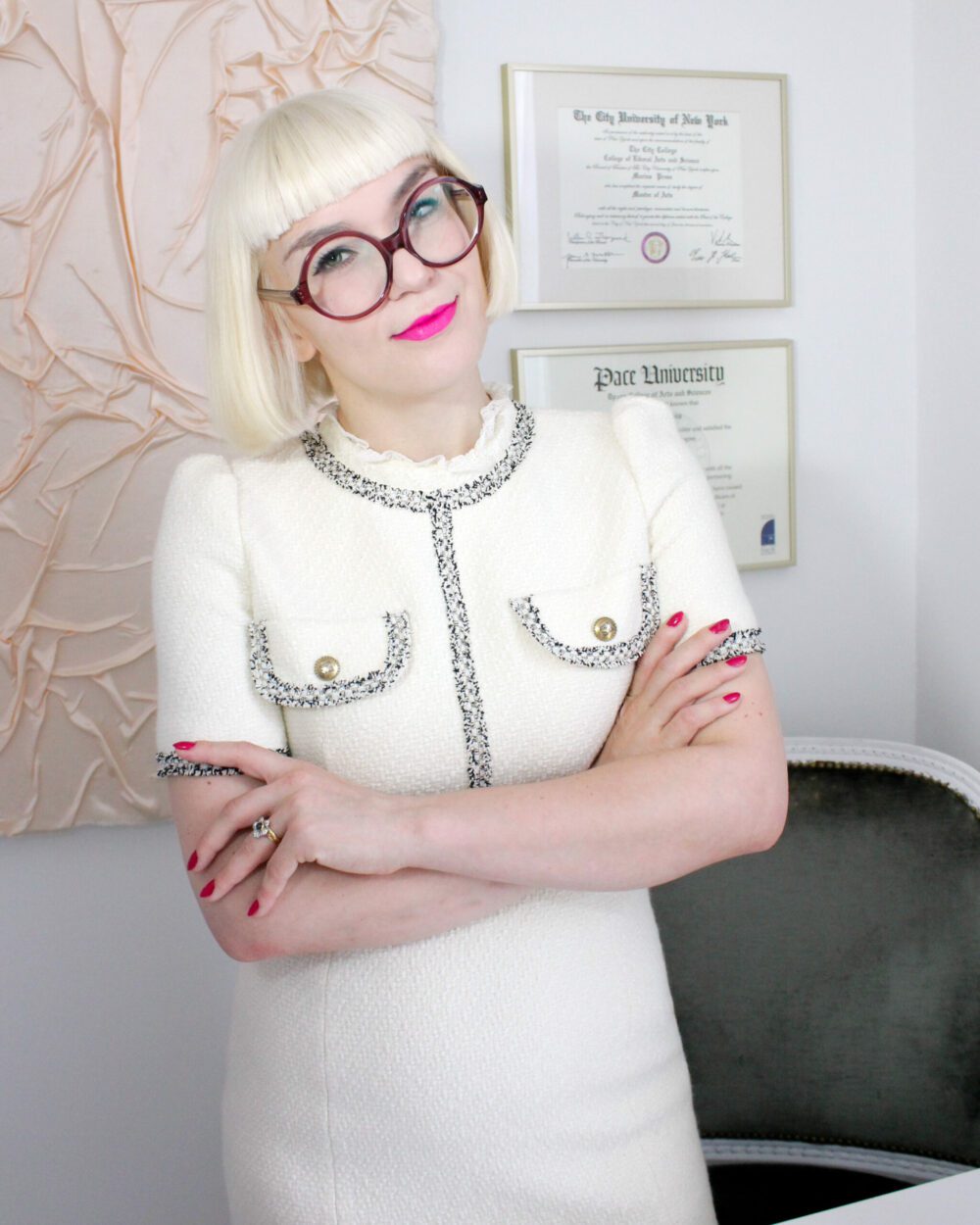WOMAN OF INTEREST: Marina Granger is the Guidance Counselor to New York’s Art World


As founder of The Artist Advisory, Marina Granger has pioneered a company to demystify the art market and offer support, guidance, and honest answers to enable artists to take their careers to the next level. Based in New York City, she works with artists by teaching them the backbone of the art market through digital sales, networking tips, and even art world politics. Canning the old-world starving artist cliché, Granger consults with a grassroots business approach to guide artists into their full potential.
Coming to the U.S. as a child with her Soviet Jewish refugee parents, Granger is no stranger to the trials and tribulations of building a career from the ground up. “I say I’ve been doing studio visits since I was born in 1984 – my parents collected a lot of art in the Soviet Union. We were able to bring some over with us, but we completely started over from an economic standpoint,” Granger remembers. “Instead of studio visits for collecting, my mother began taking me to The Metropolitan Museum of Art. I remember being a curious little critic, and looking around and thinking, well why is this here? Who decides what has enough value to go on these walls? This seed of curiosity that was planted inside of me as a young girl kept me going through college, and into a graduate degree in art history. That’s how I got into art. Now I’m working with artists, helping them realize how they can get on those walls. I haven’t figured out everything, but figured out a lot after working in the New York art world for fifteen years.”
Imbued with an inexorable work ethic, Granger certainly put in the effort, finding herself in the seemingly unending professional maze that so many creative and ambitious New Yorkers have had to navigate. In order to succeed in the New York Art World, she had to sacrifice work-life balance. “I would go above and beyond and overextend myself, working for people who wanted me to do fifteen jobs at once,” Granger says. “I noticed a lot of people in positions of power were not only giving me, but the artists we were working with, the major run-around.” Granger felt disenchanted and frustrated by the hierarchical nature of the industry, and felt it needed a major cultural power and perception shift. The power needed to return to the artists fueling the industry.
Granger ventured into unchartered territory and directly and independently began consulting and advising artists based on her education and extensive art world experience. “I thought, I’m going to offer a different kind of service for artists breaking into the art world, like an art world guidance counselor. I wasn’t thinking of The Artist Advisory as a business; it was a service I knew I needed to do, and it came from my heart,” Granger explains. “I was a bit overwhelmed at the idea of overhead, so I thought, the internet will be my office space – sky is the limit.” As she started this business, she realized an even greater demand for guidance and practical marketing skills than she had first imagined. “All of a sudden, everyone was contacting me, and it was very much word of mouth. I was known for teaching artists how to get connected on the internet, but really, my first batch of clients came from my connections, from people in real life,” she says.
During her gallery girl days, before it was standard, Granger started utilizing Facebook as a platform for online sales. While working in a museum she noticed major budgets were being allocated for Social Media Marketing. At her next stint at a smaller gallery she brought this awareness to her manager. “I convinced a gallery owner I was working with to let me create a Facebook page for our gallery,” she says. “I said, everyone’s staring at Facebook, so why not? We’re a business. That week, he sold a painting that he posted, and was enthralled!”

Through the power of mindset and perception, Marina Granger firmly believes the lingering trope of the “starving artist” will vanish. “In realms of creativity, we live the reality we tell ourselves. There are artists out there – they don’t have to be as famous as Jeff Koons or Damien Hirst, you may not even know their names – but they’re making multiple six figures selling their work. There are plenty of homes out there, plenty of collectors looking for work,” Granger says. “You don’t need to be a starving artist – it’s okay to be an artist and make a living. And also, you don’t need to be extremely famous to make a living as an artist. If you want to be, you can be. But those people are just people too, they’re not superhuman. Ultimately what stands between you and them is your mindset, your vision of possibility.”
Granger says the first step is changing your perception. “Our brain believes whatever it is that we’re saying to it,” she explains. “So if you’re reading this, look for a heavy object. I have this giant Amethyst crystal; if I tell myself I’m going to try to pick up this heavy object, and then I pick it up, I can feel its weight. But if I say, ‘I’m going to pick it up with no problem,’ I don’t feel the weight. It’s an interesting experiment you can try.”
It takes a specific kind of grounded person with a firm vision and sense of self to actively work as a business strategist; Granger believes that to grow in your business, or in your life, you need to make sure you have a growth mindset. Her infectious warmth and passion aids in her work as a creative mentor and community organizer. Aside from The Artist Advisory, Granger leads regular Art Walks and Studio Visits for members of Soho House in the Lower East Side. Her innate sense of community plays hand in hand with her optimistic art world philosophy that orbits around the power of mindset. Granger has rituals and practices that enable her to refuel – and consistently offer this critical backbone of support to guide artists. “To ensure I’m present for my clients, I make sure that I’m happy, and I’m growing,” she says.
This understanding stems from the work of Stanford psychologist Carol Dweck, synthesized in her remarkably insightful Mindset: The New Psychology of Success. The book offers a window into the power of our beliefs, both conscious and unconscious, and how changing even the simplest of them can have a profound impact on nearly every aspect of our lives. A fixed mindset sabotages or stunts by creating obstacles, and focuses on feeling threatened by the success of others, rather than finding lessons and inspiration.
Aside from her lovable, fluffy cloud of a puppy, Odette The Pom, Granger enjoys personal development podcasts (Oprah’s SuperSoul, Natalia Benson’s podcast, Chakra Girl Co., anything Gala Darling does, and Manifestation Babe). She also helms her own, The Artist Advisory Hotline (tailored specifically for artists, of course), with honest answers from leading experts in the art world. “A lot of people shy away from saying that they like to do personal development, or, ‘self-help.’ I really enjoy listening to podcasts that are going to help me remove blocks that I’ve put on myself, because of the context of my backstory,” Granger says. “My family came here as refugees with zero money, and that feeling of scarcity, anxiety, and lack, I deeply understand. It’s a high priority on my personal list of blocks and triggers. I work actively every day to remove that money block. In turn, it helps me remove that from other artists that I work with, whether they’re struggling from the context of their upbringing, or mental setbacks they’ve inflicted upon themselves.”
Granger also has a daily gratitude ritual: the first thing she does when she sits down at her desk is acknowledge what she is grateful for, and says her daily goals out loud. “It takes two minutes, but boy, let me tell you, if you talk for even one minute about everything you’re grateful for, you are going to feel good,” she gushes. “I’m not gonna lie, meditating is very hard for me because I am a busy body, but I always make time to practice gratitude. The vibrations of the words are powerful.”

Granger has a four-part method she walks through with artists. The first step is gaining an understanding of the intention behind their work, and what their goals are. The artist needs to know what they want, and how to communicate it. The second part is mindset, because each artist needs to build their confidence in communicating what they want (and to whom). The third thing is developing the presentation of the work through building, or revamping, their online presence. She often tells artists to approach marketing their work as though they’re the merchandise. “It sounds clinical, and I hate to say that, because it’s a living, breathing thing,” she says. “When you think of merchandise, do you want to put yourself in Neiman Marcus, or Target? Both of those are fine, they just need to be presented in a different way.”
The fourth part of Granger’s method is the actionable steps artists need to take once their presentation is down. “In my method, there are three steps that are very tangible, but one is not, and that is mindset,” she says, adding that she always recommends artists read The Big Leap by Gay Hendricks, which posits that our ego operates between two parallels: a baseline (making sure your rent or mortgage is paid, you’re able to eat, essentially the non-negotiables) and an upper limit (giving a TEDtalk, becoming the next Oprah, having a solo show at MoMA). Fear comes from not knowing what’s beyond these extremes, and ego kicks in – sometimes to protect us from dipping below our baseline, but also to sabotage us as we approach our upper limit.
“When we want to reach a big goal, and oftentimes artists really do, they have an upper limit that’s kind of low, because of their societal conditioning,” Granger explains. “When we want to reach that big goal, it’s so important to figure out how you can take the ego out of it. Try to give instead of wanting to receive. When you take the ego out of it, it can no longer sabotage these big goals.” Recently, she put this into practice when giving a talk to over a hundred artists. Having never spoken to that many people at once, she felt her ego kick in. “I was terrified… and I squished my ego by saying, ‘I’m not doing this for me, I’m doing it for them. I’m giving them something.’ I ended up giving away three free sessions to really scorch my ego, but it really helped. Next time you’re thinking about a big project you want to finish, think about how you can take the ego out of it.”
There’s a shift happening in the art world, with power returning to the artists. Granger’s guidance rides the new wave of artists gaining agency and learning to manage elements of their practice as digitally-based creative entrepreneurs. She offers interesting strategies for driving sales, too. “Don’t tell people that you’re selling stuff in your stories on Instagram – a really cool way to do that would be to just say, ‘Hey, here’s a picture of my work of art in [someone’s] collection.’ And then people’s gears start turning. They’re like, ‘Oh my god, we can buy this!'” she advises. “Put it on your grid already installed in somebody’s home. Tell us every time you’re selling something, instead of when you want to sell something.”
Granger says Instagram is doing for art what radio did for music. “Listening to a song on the radio, you get a taste of it, but you can still buy it. The same thing is happening on Instagram – you get a taste of the artwork, but you can still buy it,” she points out. “I worked in galleries before social media and this is a profound change that’s happening in our culture. And I’m really curious as to how it’s going to play out in the economy of the art industry.”
Due to the pandemic, a lot of exhibitions have moved online, as part of the ‘online viewing room’ trend. Granger strongly feels this showcasing format should stay relevant in the art world ecosystem post-pandemic. “We have a taste of super globalization right now. By living our lives online, you can connect with people from all over the world,” she says. “It’s important not to limit yourself by only having an exhibition in person – put it online, do a virtual viewing room. It’s what a lot of really high-end galleries were doing before COVID. Now, because there’s such a demand for it, virtual viewing rooms are so much more accessible to everyone.”

Next month, Granger launches her sixth online summer course, The Artist’s Academy. The program entices artists interested in joining a community that helps them navigate the art world (it’s a close knit group of about 20 artists) and also helps individuals present their work in the best possible light online. “If you have 10 works of art, you can sign up for this, and if you don’t have that yet, you can still sign up. I love to have a variety of different levels of artists in this course, because even mid-career artists who take this course learn something from the emerging artists, and vice versa.”
Marina Granger says that she’s always listening to and learning from her clients, as well. “Since there aren’t many businesses like mine, there isn’t really an example of what a business like mine should provide,” she says. “I couldn’t have this business without the inquisitiveness of my clients. They teach me everyday about new ways I can help them develop their careers.”
Follow The Artist Advisory on Instagram for ongoing updates.

